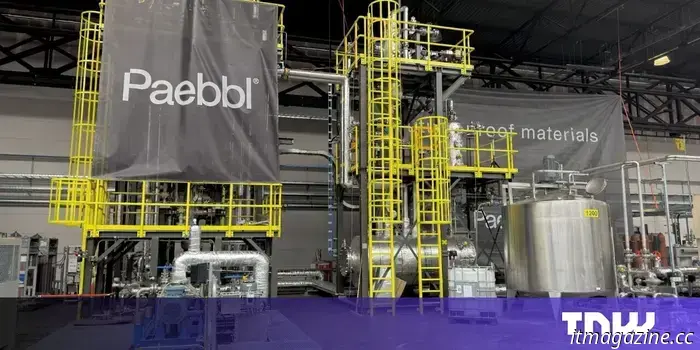
Paebbl launches the 'world's first' demonstration plant that converts CO2 into dust.
Paebbl has inaugurated its first demo plant in Rotterdam as it aims to enhance its carbon capture technology.
During our visit to Paebbl’s extensive facility in June of last year, it appeared as a mix of prototype machines, batch samples, and equipment—some of which was still in its packaging. Now, the site is reportedly the largest facility in the world that can continuously mineralize CO2.
Paebbl announced that the plant was completed in "record time" with assistance from Dutch engineering firms Spie and Vicoma. The project also received a financial investment from the Netherlands Enterprise Agency (RVO), although the amount remains undisclosed.
Andreas Saari, co-CEO and co-founder of Paebbl, stated that this milestone brings the Dutch-Nordic startup “one step closer” to combining high-performance materials with climate impact “on a scale that truly matters.” Saari, the former CEO of Slush, co-founded Paebbl in 2021 with his ex-Northzone partner Marta Sjögren, early Klarna investor Jane Walerud, and Dutch scientist Pol Knops.
How does Paebbl’s technology mineralize CO2?
Paebbl’s technology speeds up the slow, natural carbon mineralization process.
The company inputs crushed olivine rock and CO2 captured from heavy industry into its machinery, leading to enhanced mineralization. The CO2 converts into CO3 (carbon trioxide) and adheres to the olivine.
For each ton of CO2 captured, it produces approximately three tons of a powder scientifically referred to as “silicon-rich” magnesium carbonate. This powder has a soft, fine dust-like texture and a gray hue with a hint of green due to the olivine composition. About half of the emissions from cement are generated when limestone is heated to make lime. Paebbl’s powder can substitute for lime and other additives in materials like wall filler, effectively transforming buildings into carbon sinks.
Paebbl is part of a new wave of carbon removal startups that seek to capture CO2 and utilize it as a resource to create cleaner products.
This method, known as carbon capture, utilization, and storage (CCUS), differs from the more traditional carbon capture and storage (CCS) advocated by the oil and gas sector, where carbon is captured at the source and stored underground.
In October, Paebbl secured $25 million from investors including Amazon and major German cement companies Holcim and Goldbeck, raising its total funding to $38 million, according to Dealroom data.
Paebbl aims to establish a commercial-scale plant by 2027. While the company has not yet revealed the site of this facility, Marta previously shared with TNW that they plan to set up factories in locations with “high demand for end products (building material), nearby feedstock supply (CO2 and olivine rock),” and access to renewable energy. In Europe, the Nordics, Spain, and Portugal are particularly favorable.
Paebbl’s goal is to bring 1 million tons of its product to the market by 2030. The startup intends to generate revenue by selling the rock powder and providing carbon removal credits to companies seeking to offset their emissions.
Sustainability will be a focal point at the TNW Conference, set for June 19-20 in Amsterdam. Tickets for the event are currently available. Use the code TNWXMEDIA2025 at checkout to receive a 30% discount.
Other articles
 Lost Records: Bloom and Rage review: punk rock endures.
Lost Records: Bloom and Rage reimagines the Life is Strange formula, crafting a profoundly emotional coming-of-age narrative set in the 90s.
Lost Records: Bloom and Rage review: punk rock endures.
Lost Records: Bloom and Rage reimagines the Life is Strange formula, crafting a profoundly emotional coming-of-age narrative set in the 90s.
 A new render of the iPhone 17 Pro leaves us speculating about its final design.
A new render of the iPhone 17 Pro has surfaced, reinforcing the notion that it will not feature a two-toned rear.
A new render of the iPhone 17 Pro leaves us speculating about its final design.
A new render of the iPhone 17 Pro has surfaced, reinforcing the notion that it will not feature a two-toned rear.
 How Trump's tariffs may alter the future landscape for Chinese technology companies.
On Monday, January 20, President Donald Trump was officially inaugurated for his second term at the US Capitol. Present at the inauguration were various foreign dignitaries.
How Trump's tariffs may alter the future landscape for Chinese technology companies.
On Monday, January 20, President Donald Trump was officially inaugurated for his second term at the US Capitol. Present at the inauguration were various foreign dignitaries.
 Mercury: superior to a bank, it's the financial operating system for your startup.
Inquire with any entrepreneur, and they'll affirm that banking is just the tip of the iceberg when it comes to startup finance. The real priorities are maintaining cash flow, securing funding at crucial moments, and avoiding being overwhelmed by administrative tasks. Mercury understands this well. It was specifically designed for these challenges. Instead of being just another SaaS solution with an attractive user interface […]
Mercury: superior to a bank, it's the financial operating system for your startup.
Inquire with any entrepreneur, and they'll affirm that banking is just the tip of the iceberg when it comes to startup finance. The real priorities are maintaining cash flow, securing funding at crucial moments, and avoiding being overwhelmed by administrative tasks. Mercury understands this well. It was specifically designed for these challenges. Instead of being just another SaaS solution with an attractive user interface […]
 Microsoft's Copilot Vision AI is now available for free, but only on these 9 websites.
Microsoft's Copilot AI is now capable of observing your screen while you browse, allowing you to ask it questions regarding your activities.
Microsoft's Copilot Vision AI is now available for free, but only on these 9 websites.
Microsoft's Copilot AI is now capable of observing your screen while you browse, allowing you to ask it questions regarding your activities.
 UK deploys microwave weapon capable of disabling drones as part of a defense technology initiative.
The British Army has neutralized swarms of drones using the “RapidDestroyer,” a new defense technology that employs high-frequency microwaves.
UK deploys microwave weapon capable of disabling drones as part of a defense technology initiative.
The British Army has neutralized swarms of drones using the “RapidDestroyer,” a new defense technology that employs high-frequency microwaves.
Paebbl launches the 'world's first' demonstration plant that converts CO2 into dust.
Paebbl, the startup that converts CO2 into dust, has launched its inaugural demo plant in Rotterdam, Netherlands.
